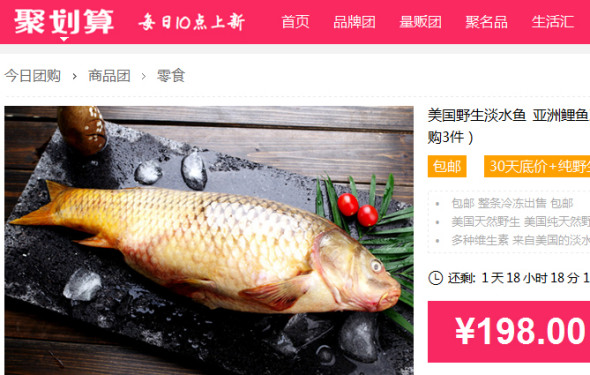
Screenshot shows Asian carp from the United States is officially put on sale on ju.taobao.com. (Photo/Screenshot from ju.taobao.com)
(ECNS) -- Asian carp from the United States, invasive fish that are posing a threat to the ecosystem of American rivers and lakes, were officially put on sale via ju.taobao.com this Sunday, but an expert said Chinese diners will not help the U.S. solve the oversupply problem.
Ju.taobao.com, the group-buying platform "juhuasuan" under Alibaba Group, joined forces with U.S. company Big River Fish Corp to welcome the return of Asian carp this week and began taking online orders for a variety of products, boasting wild Asian carp caught in unpolluted U.S. water, at prices ranging from 49 yuan ($8) to 198 yuan ($32), China National Radio reports.
Although some Chinese citizens have ordered the latest products online and are awaiting delivery, to commence May 28, others say they would not buy imported frozen fish due to taste and health concerns, the report states.
Asian carp, a term that covers a total of eight fish from Asia, were originally introduced to U.S. waters in the 1970s to control the spread of weeds and parasites. However, their numbers grew rapidly, crowding out local fish populations and damaging ecosystems.
The U.S. has spent 25 years as well as 18 billion dollars in attempts to solve the problem, though as yet unsuccessfully.
According to Zhu Yi, an associate professor with the China Agricultural University, imported Asian carp were seen in China four years ago but then exited the market as they had no advantages compared to domestic fish in terms of either cost or taste.
Zhu said the high-profile comeback this time will not necessarily make a difference.
Compared with captive-bred fish, wild varieties could actually pose more health risks, while U.S. water systems are not necessarily pollution free despite the country’s bluer skies and fresher air, he warns.
Strict quality supervision, inspection and quarantine procedures will help minimize such risks, however consumers should still be concerned about the taste of frozen fish, it was added.
Americans should visit China to learn from its experience in breeding and managing freshwater fish.


















































